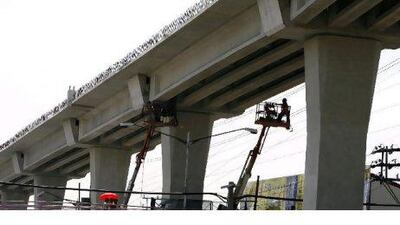Nations in the region recognise the importance of modern infrastructure to their economic progress, but results in the Philippines do not match the stated commitment.
If Asia is to maintain its economic growth, it needs to spend an estimated US$500 billion (Dh1.83 trillion) annually for the foreseeable future, according to estimates by the World Bank and the Asian Development Bank.
India plans to spend about $1tn improving highways, ports, airports, power plants and other infrastructure over the next five years, the prime minister, Manmohan Singh, said this year.
China continues to spend billions on infrastructure, especially railways, while tiny, impoverished Laos is planning to build up to 50 dams along the mighty Mekong River with money coming from foreign investors - mainly China.
Thailand, despite the insurgency in the south and political troubles playing out regularly on the streets of the capital, Bangkok, plans to spend $45bn during the next three years to upgrade its infrastructure.
In Manila recently, the Philippine government held a three-day international conference to attract billions of dollars for infrastructure projects such as roads, railways, ports, irrigation and power.
Benigno Aquino, the president, has made infrastructure a major policy objective for his six-year term, saying that this will be the key to the country's economic success.
His predecessor, Gloria Macapagal Arroyo, also saw infrastructure as the way forward for the country. In her last state of the nation address before she stepped down as president in June, she promised that 149 infrastructure projects she initiated would be completed by the end of this year. As of this month, just 39 had been completed; 21 of them ports.
The Manila conference was part of the government's ambitious private-public partnership programme aimed at attracting not only foreign investors, but also local investors with the issue of government infrastructure bonds.
The government's economic planners know the only way forward for the country is through infrastructure, but the government has neither the resources nor the funds to invest in major projects. This year, the government will spend just 3 per cent of GDP on infrastructure, and this will drop to 2.8 per cent next year, according to official estimates. The World Bank minimum is 5 per cent of GDP.
The Manila conference addressed three major impediments to foreign investment in the Philippines - corruption and red tape, poor policy planning by government and inadequate infrastructure.
"The new government is faced with decade-old problems which have discouraged private-sector investments in infrastructure," Cesar Purisima, the finance secretary, told BusinessWorld newspaper recently.
"We're not saying this will be fixed overnight, but we're saying that we know the problem, and the entire economic team is aggressively finding ways to solve these problems.
"The biggest draw of the Philippines right now to investors is that they are confident that the country's new leadership will ensure a level playing field. There's a new sheriff in town, and the private sector knows he means business. No secret deals, no under-the-table transactions. Everything will be done in broad daylight. That's the big difference."
But that may be easier said than done.
Many foreign investors have come to the Philippines only to be burnt, whether through contracts that are broken, rulings by the Supreme Court changing laws affecting the business environment, regulations and laws that can be changed without notice, interference by local governments, corruption, lack of infrastructure and the church blocking projects - particularly mining ventures.
John Forbes of the American Chamber of Commerce in the Philippines was quoted in The Philippine Starthis month as saying: "Very few projects of any size were accomplished in the last decade." And he pointed to Manila's new airport terminal, where the government is still in dispute with its German builders decades after the contract was signed.

